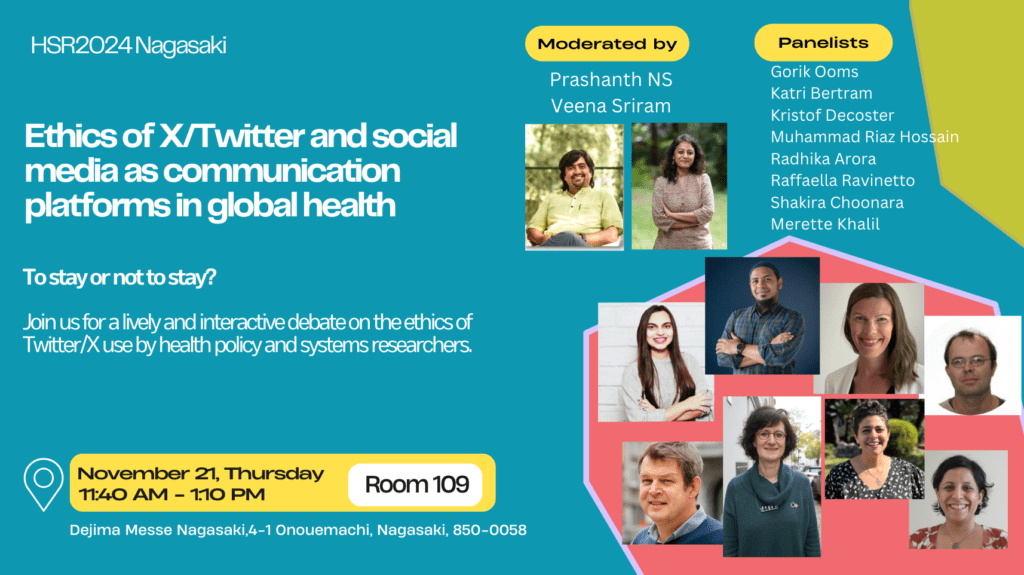
Summary of #HSR2024 Nagasaki interactive debate
Is it ethical for health policy and systems researchers to use X, formerly Twitter? As we began planning our session several months before the 8th Global Symposium on Health Systems Research (18-22 Nov) in Nagasaki, Japan, we wondered whether this topic was too niche. Since November, however, organizations and people have been leaving X en masse (not only because of our timely session).
In Nagasaki, several of us spoke about feeling conflicted professionally and personally, yet continued to stay on and use X. Reasons to stay included our mission to drive health awareness globally, a commitment to speak truth to power, a continued need to understand different points of view as well as to maintain a dialogue, and the need to differentiate between what we post, and what a platform and others share.
We generally agreed that X is owned by a person who is causing harm – to global solidarity, democracy, and science – yet this is – in the words of one panelist – “a devil we know.” Also, X is where many of us built our professional virtual families and continue(d) to get most of our information. Some of us are unwilling to give up what we consider “our” platform, and our job as health experts and researchers is to continue to fight with facts. Panelists also discussed the voice and space claimed by researchers in the Global South on X, and the implicit and explicit tensions underlying the “exodus” to Bluesky by primarily Global North-based individuals. For some, X is not all bad, and it is not bad nor toxic for everyone.
Till November, the alternatives to X looked fragmented and perhaps raised just as many questions. Would we jump from “the devil we know to the devil we don’t”? Rather than leaving X for another platform (with Bluesky as the current preferred alternative), should we not, instead, advocate for strong regulation and legislation for all platforms and at all levels – global, regional, and local – to protect users from risk, combat misinformation, and ensure the ethical and responsible use of these platforms for good? One audience member also raised the connections between X and Artificial Intelligence (AI), and how the type of discourse on the platform will shape the direction that AI on the platform takes, perhaps an argument for more progressive voices to remain, and also an argument for continued monitoring and regulation of AI.
Despite the complexity and nuances, we also raised red lines in our discussion. We need to set some parameters for what types of political determinants are acceptable and what are not. When do behaviors and actions of industry become too toxic and destructive, and at what point should we consider boycotts as a critical advocacy tool? Can we argue for increased regulation on the one hand and – as participants from the US in particular feel – do so on a platform owned by an individual who is currently dedicated to dismantling regulation and the public sector? We also have to protect our mental health and perhaps question our feeling of dependence on social media for information and networking. By staying, we are supporting a platform that now mainly thrives on disinformation and hate.
Ultimately, we agreed that everyone needs to make their own decisions on whether to stay on or leave X – or social media altogether. In this age of disinformation, this debate has only just begun… and so, to be continued at the next HSR symposium in Dubai, as Gorik Ooms pointed out in his wrap-up?
Session moderators: Veena Sriram, Prashanth NS. Speakers: Gorik Ooms, Katri Bertram (video), Kristof Decoster, Muhammad Riaz Hossain, Radhika Arora, Raffaella Ravinetto, Shakira Choonara (video), Merette Khalil.